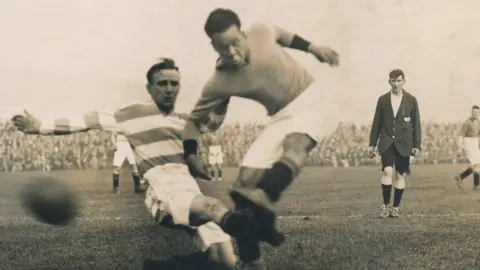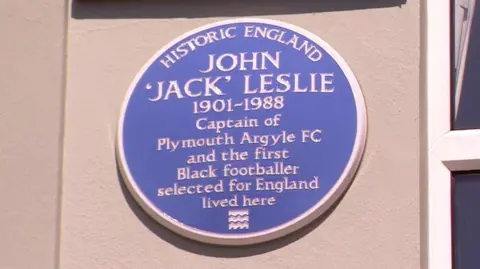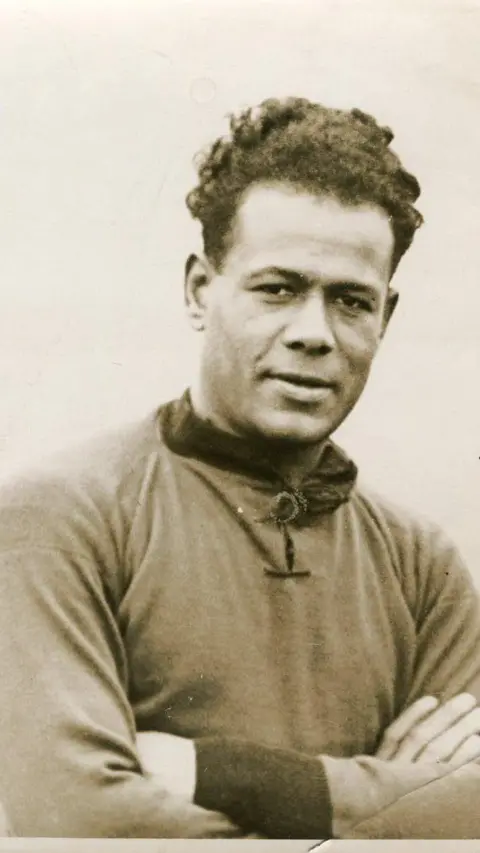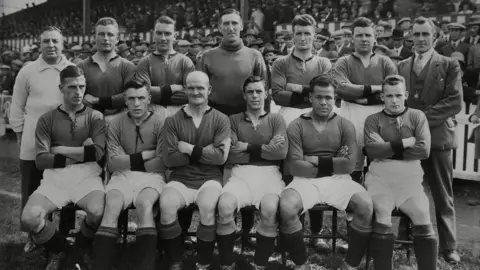Football 'trailblazer' celebrated with blue plaque
 Western Morning News
Western Morning NewsDescendants of groundbreaking footballer Jack Leslie - the first black player to be called up for England - have unveiled a blue plaque at his former home.
The event by Historic England at 8 Glendower Road in Plymouth marked the 100th anniversary of Leslie's call-up as a reserve for the England squad in October 1925.
Despite being the first black player to be called up for the national side, his name disappeared from the team sheet because of his skin colour.
His career at Plymouth Argyle FC, which he captained, was distinguished by his remarkable skills as a striker, scoring 137 goals in 401 appearances.

Family members at the event included George Connett and Kate Greenaway, Leslie's great-great nephew and great-great niece.
"It's a great honour," said Mr Connett. "Hopefully, future generations can look at this story and take it back to what it's really about, community, supporting your people, and recognising greatness."
Ms Greenaway added: "We're really, really proud. It's come a bit late, but it's here now, and we're proud of that fact."
The unveiling follows the installation of a statue in Leslie's honour at Plymouth Argyle's Home Park ground.

Historic England chief executive Duncan Wilson said: "Jack Leslie's story is one of talent, resilience, and breaking barriers.
"This plaque ensures his legacy is remembered and celebrated."
Reflecting on the honour of being selected for England, Leslie once said: "Everybody in the club knew about it.
"The town was full of it. I was proud, but then I was proud just to be a paid footballer."
Eye injury
Leslie rarely missed a game for Argyle and was joint top-scorer in the 1928-29 season with 22 goals.
On 10 March 1928, he was given the captain's armband in an away match against Norwich.
Leslie's final two seasons as a professional footballer were overshadowed by an injury to his eye, which forced him to miss much of the 1933-34 season.
He struggled to regain his old form and played his final match in April 1935.
 Leslie family
Leslie familySoon after his retirement from football, Leslie took on the tenancy of the Swan Inn in Truro, Cornwall, which he ran until 1938.
Later that year, Leslie and his family moved to east London. He worked as a boilermaker, riveter and plater in the East India Docks until his retirement in 1966.
At the suggestion of his daughter, Evelyn, Leslie then found a part-time job cleaning boots and sweeping terraces at West Ham United's then stadium Upton Park, near his home in East Ham.
In 1978, the former footballer was interviewed by the Daily Mail and reflected on his career and the racism he had encountered.
 Colorsport/Shutterstock
Colorsport/ShutterstockIn October 1982, he was honoured with a brief ceremony before the match at Upton Park to mark his retirement from the West Ham boot room.
Mr Wilson said: "Leslie's story is not only about football, it is a testament to his resilience in the face of racism.
"While he never played for his country, Leslie's story serves as an inspiration for current generations, to continue to challenge racial boundaries in sport."
'True trailblazer'
Paul Elliott, co-founder of anti-discrimination group Kick It Out, said Leslie was a "true trailblazer of our game, a player of outstanding talent who broke down barriers and helped shape the history of English football".
"This blue plaque not only honours his achievements on the pitch but also recognises his wider contribution to society and tackling discrimination off it," he said.
Plymouth City Council's deputy leader, Jemima Laing, said it was an "important moment in celebrating Plymouth's rich local history and the remarkable achievements of Jack Leslie".
"His legacy goes far beyond the football pitch and it's wonderful to see him getting the recognition he was once denied but certainly deserves," she said.
Heritage minister Baroness Twycross added: "Jack Leslie's blue plaque celebrates his life and inspirational achievements during his career as a talented footballer.
"This plaque will serve as a reminder of his remarkable talent, resilience, and contribution to the game."
Follow BBC Devon on X, Facebook and Instagram. Send your story ideas to [email protected].
